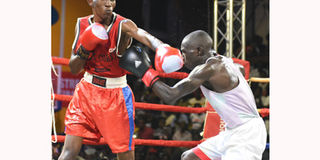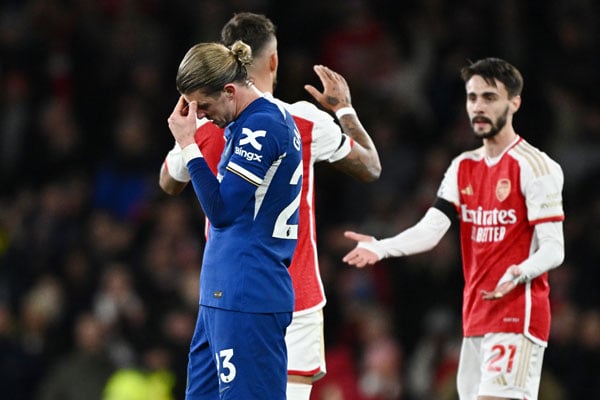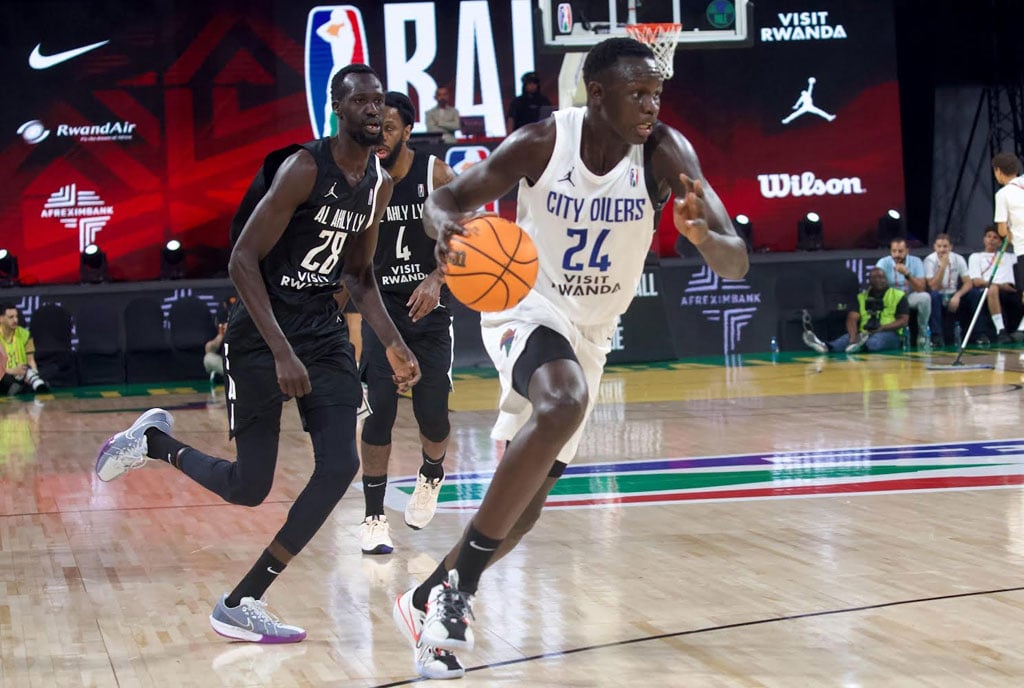Katongole ‘The Stranger’ back in the ring with bigger dreams

Take That. Katongole’s punch finds the face of arch rival Muhammad Lwanga (L) in a bout last year. PHOTO | ISMAIL KEZAALA
What you need to know:
- Comeback Trail. After failing to make the Olympic grade, Katongole decided to quit boxing because he was demoralised and felt that his boxing future was bleak. But he has returned with renewed passion to turn pro.
Ordinarily, boxers rise from Cadets or Novices level to Intermediates but John Bosco Katongole is not ordinary. He first boxed at the Intermediates in 2014, and two years later, he went a level back to begin afresh. But his entry was a typical mystery.
“I was doing roadwork through Mulago, just for fitness, and the boxers I found on the way asked me ‘aren’t you going for the weigh-in?’”
“I had no idea what they meant but went with them.” At the tournament everything was strange. “Even my seconder didn’t know me.”
Katongole lost instantly. “But it was crazy how people were screaming my name.” Lessons?
“Respect a fighter whether he wins or loses, those shots are dangerous.” He went off the scene for two years, focusing on his job as cleaner with one company in Nakawa.
Katongole returned in 2016 to relaunch his journey. Representing Kololo High, he reached the semis of the Cadets Championship, reached the Intermediates finals, but lost the quarterfinals of the National Open.
He disappeared again, until the end of 2018 when he started training at East Coast, the nearest club to his workplace. After winning a suicide (unsanctioned) fight, he believed again.
But East Coast demanded commitment. Two years ago the club’s best boxers had defected to KCCA.
“Coach Hassan [Khalil] asked me to choose where I belong. East Coast or Kololo?”
He chose East Coast. “It’s like a boxing school,” Katongole says.
But it was tricky: Juma Miiro, his potential flyweight rival, had just won bronze at the 2018 Commonwealth Games, and was related to the coach. He is also a close friend to Musa Shadir, who had returned from KCCA. Adam Kassim, a 1999 All-Africa Games silver medalist, was another ‘family’ member. How could Katongole coexist here without causing tension?
“Our door is always open and we try to treat everyone equally,” says Coach Hassan. “But Katongole is also a well-behaved boy and listens to advice.”
Miiro has sparred with Katongole several times at East Coast and finds him an intelligent boxer who is good at defending. “He mastered keeping the opponent at a distance, and it works for him.” His weakness? “Only that sometimes he is slow.” The reward was the gold medal at the 2019 National Open. In the final Katongole upset the experienced and more skilled Muhammad Lwanga.
Dreams shattered
Born to Leokadia Nakazibwe and Charles Kakooza, Katongole grew up with step mothers after his parents separated when he was in Primary Three.
Bred in Mulago Medical Quarters, near a football pitch, soccer was his first love. But his father, who works at Mulago Hospital, wanted his first-born to study medicine. For his secondary education, Ka tongole went to Sacred Heart Seminary, Mubende, and the two tattoos on his left arm, one across, symbolise his strong Catholic affiliations. From there he attended three schools in Kampala before finishing his Advanced Level at Kololo SS. Mulago being a sporting hub, the teenager was already admiring boxers who trained around.
“We wanted to be around them.”
And later, Katongole and other youths began training with the boxers. “It was tricky. If my father was at home I would show him I’m washing the dishes, if he is away, I’m training boxing.”
The battle to win his father’s support for boxing is still on.
After winning the 2019 Open, Katongole, started imagining himself at the Olympics. But twice he has been disappointed. First, he missed the 2019 African Games. “They chose my opponent without testing us in a fight,” he says. “I was very fit and in sparring, I jabbed him like twice and the coaches stopped us.”
After months at Luzira Prisons, where the boxers had camped ahead of Morocco, Katongole returned home dejected. But he worked harder for the 2020 African Olympic Qualifiers in Dakar, Senegal. At the national trials in December 2019, he met his archrival Lwanga. “He is a good boxer but I have mastered how to punish him. My opponents are superior in most aspects…but I use my long reach to dominate them.”
But this time Lwanga was announced the winner. “I was shocked. It was like someone had just pulled me off the plane, I almost remonstrated to the judges. It was the worst boxing moment.”
Back to his job, bosses and colleagues made fun of him. It was more heartbreak.
Meeting Ian
Katongole would side-step his boss to go train at East Coast. His time was always limited “but Coach Hassan [Khalil] would make me sweep the gym after training yet I wanted to rush back to work. I hated it but I couldn’t show him.”
But this patience and obedience would win him a recommendation to a very important person in his career.
“Coach Hassan connected me to Mr. Ian because I’m well-behaved,” he says, as Ian Payne, his caretaker, seated on the lawn at his home in Naguru, smiles. “And he has helped me revive boxing.”
After returning from exile in Kenya, Hassan, twin brother Hussein Khalil, who won Kenya gold at the 1982 Brisbane Commonwealth Games and, and 1988 Olympian John Bosco Waigo, established East Coast gym in Naguru to distract idle youths from wrongdoing. Many of them have won national and international honours.
After the Olympic disappointment, Katongole decided to quit boxing.
“I was demoralised. My boxing future looked bleak. Like I was simply wasting time.”
And consolations that ‘you are a good boxer’ started sounding sheer nonsense.
“It’s a dilemma. You are praised at the gym, but at home you’re a loser, who dumped education for a futile sport.”
But Ian, a Briton, who usually visits East Coast, made him think twice.
“Last year he invited me to a Christmas party, and convinced me to go professional,” Katongole says.
Ian just reminded him of the promise he had made if he did not make the Olympics.
“Most people wanted me to go back to amateur and build a fan base. But I’m 26, soon I’ll have a family…shall I turn pro when I’m 40?”
Ian convinced him the best time is now. His coach Hassan, concurs. “As long as he gets good management…you know some promoters are just money-minded and dent boxers’ careers.”
Back in the gym
In a garage-turned-gym, there are 49 medals, all from Ian’s running adventures. There’s a Chelsea emblem on the wall, dumbbells, three pairs of gloves. There’s Anthony Joshua punching Wladimir Klitschko.
There’s Muhammad Ali. There’s Mo Farah, all in portraits. Then there’s Katongole in blue trainers, a black pair of sweatpants with Real Madrid and Champions league emblems, and a black sleeveless vest, doing the treadmill.
He breaks for minutes. Then punches the bag. Those lean, long hands are deceptive by looks. They hit hard and the bag swings upon every punch. But unlike Katongole’s opponents, the bag cannot escape.
“My dream is fighting foreign boxers abroad, I missed them in amateur, I’ll meet them as a pro,” he says with a straight face. “But I know it starts with knocking the local opponents out of the way.”
Nara-Box Promotions is preparing the potential super flyweight for his first pro bout.
Such Ian’s commitment to Katongole’s revival that he even offered to pay his salary so that he quits the cleaning job and concentrates on boxing.
Immediately after Katongole steps off the treadmill, Ian picks the sanitizer bottle and disinfects the treadmill. He wants it safe for himself. Safe for John, as he calls the boxer.




